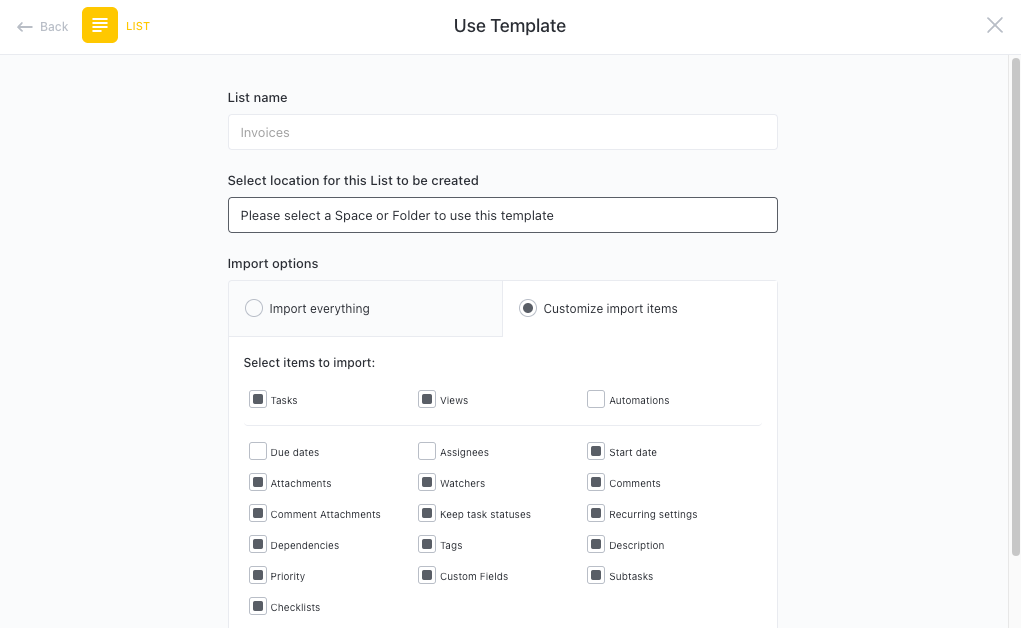Change is a constant in today's fast-paced business world, and it's crucial to ensure that everyone in your organization is on the same page when it comes to implementing change. That's where ClickUp's Change Meeting Agenda Template comes in handy.
With ClickUp's Change Meeting Agenda Template, you can:
- Clearly define the purpose, goals, and agenda of your change meetings
- Keep your team members informed and engaged throughout the change process
- Track progress, identify roadblocks, and assign action items to ensure accountability
Whether you're rolling out a new strategy, implementing process improvements, or undergoing a major organizational change, ClickUp's Change Meeting Agenda Template will help you navigate the journey with ease. Get started today and lead your team to successful change!
Benefits of Change Meeting Agenda Template
Change Meeting Agenda Templates provide numerous benefits for organizations undergoing significant change by:
- Setting clear objectives and goals for change meetings, ensuring that everyone is on the same page and focused on the desired outcome
- Facilitating effective communication by providing a structured framework to discuss progress, challenges, and potential solutions
- Promoting collaboration and engagement among team members, encouraging active participation and idea sharing
- Ensuring accountability by documenting action items, responsibilities, and deadlines, preventing tasks from falling through the cracks
- Enhancing efficiency and productivity by streamlining meeting discussions and reducing time spent on unnecessary topics.
Main Elements of Change Meeting Agenda Template
ClickUp's Change Meeting Agenda Template is the perfect tool to streamline your change management meetings and ensure nothing is overlooked.
- Doc Template: Use ClickUp's powerful document editor to create a comprehensive meeting agenda that outlines the purpose, objectives, and action items for each change management meeting.
- Custom Statuses: Track the progress of each agenda item with custom statuses such as To Do, In Progress, and Completed, ensuring everyone is aligned and accountable.
- Custom Fields: Add custom fields like Change ID, Owner, Priority, and Impact to capture important information about each change initiative and prioritize discussions accordingly.
- Different Views: Access the meeting agenda in various views, including the Board view for a visual Kanban-style representation, the Calendar view to schedule meetings and set due dates, and the Table view for a tabular overview of all agenda items.
- Collaboration: Collaborate with stakeholders and team members by @mentioning them in the document, leaving comments, and utilizing real-time editing capabilities to enhance communication and decision-making.
How to Use Meeting Agenda for Change
If you're looking to streamline your change meetings and make them more effective, follow these steps to use the Change Meeting Agenda Template in ClickUp:
1. Define the purpose of the meeting
Before you start creating your agenda, it's important to clearly define the purpose of your change meeting. Are you discussing new initiatives, addressing challenges, or reviewing progress on ongoing projects? Knowing the purpose will help you structure the agenda and ensure that all necessary topics are covered.
Use a Doc in ClickUp to outline the purpose of the meeting and gather input from team members.
2. Identify the key discussion topics
Once you have a clear purpose, identify the key discussion topics that need to be addressed during the change meeting. These topics can include updates on projects, challenges faced, proposed solutions, and any other relevant information.
Create tasks in ClickUp to capture and organize the key discussion topics for the meeting.
3. Assign time slots for each topic
To ensure that your change meeting stays on track, assign specific time slots for each discussion topic. This will help the meeting attendees know how much time to allocate for each topic and allow for a more efficient use of time.
Use the Calendar view in ClickUp to schedule the meeting and allocate time slots for each topic.
4. Share the agenda with attendees
Once you have finalized the agenda, share it with all the meeting attendees in advance. This will give them an opportunity to review the topics, come prepared, and contribute effectively during the meeting.
Send the agenda to the meeting attendees using the Email feature in ClickUp, or share it directly within the project using the collaboration tools available.
By following these steps and utilizing the Change Meeting Agenda Template in ClickUp, you can ensure that your change meetings are focused, productive, and result-oriented.

Get Started with ClickUp’s Change Meeting Agenda Template
Managers and team leaders can use the Change Meeting Agenda Template to effectively communicate the purpose, goals, and progress of a change initiative within their organization.
First, hit “Add Template” to sign up for ClickUp and add the template to your Workspace. Make sure you designate which Space or location in your Workspace you’d like this template applied.
Next, invite relevant members or guests to your Workspace to start collaborating.
Now you can take advantage of the full potential of this template to plan and conduct change meetings:
- Use the Planning View to outline the objectives, agenda items, and desired outcomes for each change meeting
- The Progress View will help you track the progress of the change initiative and discuss any challenges or roadblocks
- Use the Action Items View to assign and track action items that need to be completed between meetings
- The Decision Log View will help you track important decisions made during the change process
- Organize agenda items into different topics or categories to ensure a structured and productive discussion
- Keep track of meeting minutes and key discussion points in the Notes section for future reference
- Review and analyze meeting outcomes and action items to ensure accountability and progress.








